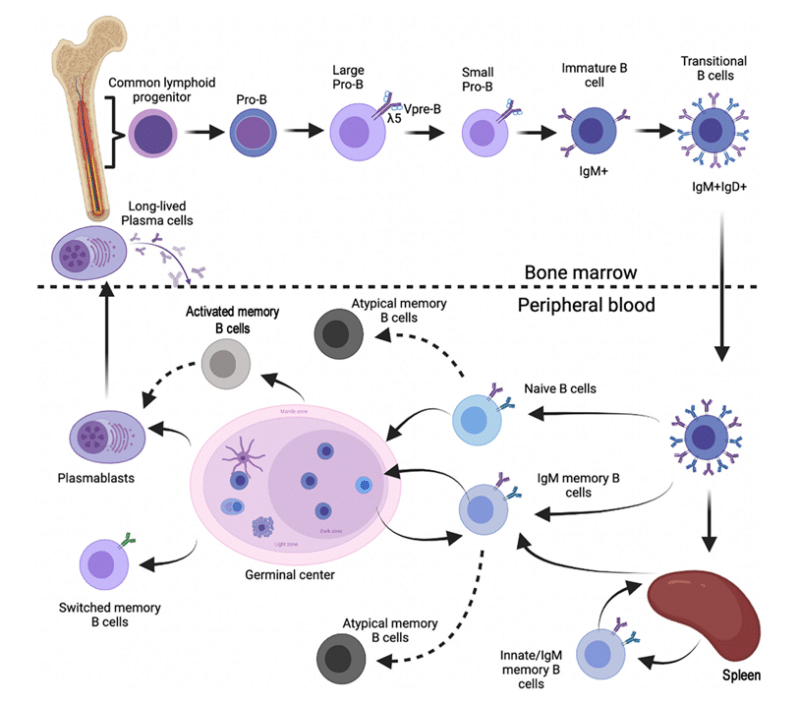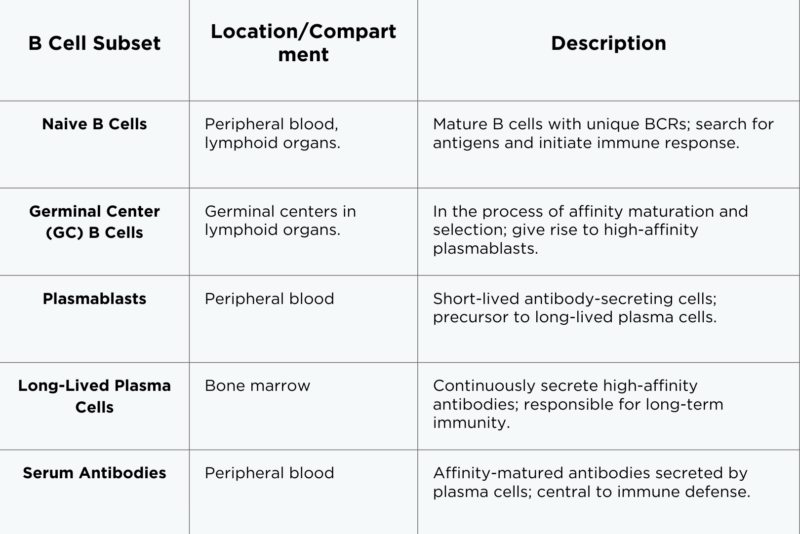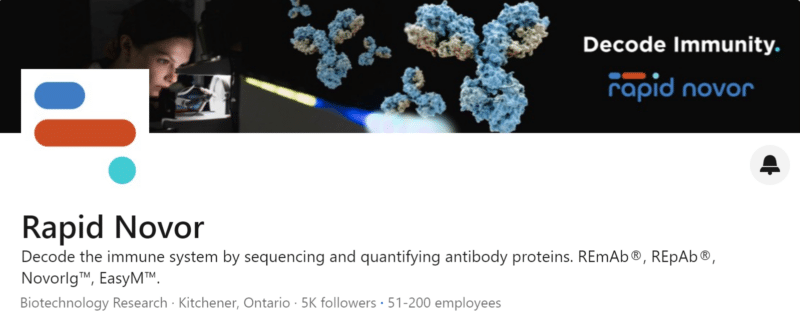
Published: December 12, 2024
Introduction
While B cells play a crucial role in recognizing antigens and initiating immune responses, their differentiation into antibody-secreting plasma cells represents a pivotal step in immune defense. These antibody-secreting cells, called long-lived plasma cells, continuously produce and release large quantities of highly specific antibodies into the bloodstream, ensuring sustained protection against pathogens and disease.
In this article, we will explore B cells, their differentiation into long-lived plasma cells, and the critical role of the antibodies they secrete in maintaining immune defense.
B Cells and Their Receptors
B cells are part of the adaptive immune system, responsible for identifying and responding to pathogens. Each B cell is equipped with unique B cell receptors (BCRs) on its surface, which are membrane-bound forms of antibodies. The diversity of BCRs arises from a complex genetic process called V(D)J recombination, which generates a vast repertoire of receptor specificities during B cell development.
Mature naive B cells circulate in the peripheral blood, searching for antigens that bind to their unique BCR. Upon encountering an antigen, they become activated B cells and migrate to germinal centers, where they undergo affinity maturation. This process introduces mutations in their immunoglobulin genes, with selection pressures favoring B cells with high binding affinity for the antigen.
High-affinity B cells differentiate into plasmablasts, and later become long-lived plasma cells that reside primarily in the bone marrow, continuously secreting antibodies to provide immunity against infections and disease. Meanwhile, B cells in germinal centers with low affinity for their antigens are eliminated through apoptosis, ensuring that the immune response is efficient and highly specific.
Choosing B Cell Subsets for B Cell Sequencing
The choice of B cell subset for antibody discovery is often influenced by sample accessibility, or animal welfare concerns. GC B cells and long-lived plasma cells, which reside in lymphoid tissues or bone marrow, are challenging to obtain due to the invasive nature of tissue biopsies.
By contrast, peripheral blood mononuclear cells (PBMCs), such as plasmablasts or naive B cells, are more readily accessible through non-invasive blood draws, making them a preferred choice for human studies. However, B cells in circulation represent only a small fraction, approximately 2-3% of the total B cell population in the body, potentially missing important functional binders.
In animal models, including mice, rabbits, and sheep, retrieving GC B cells and long-lived plasma cells is technically more straightforward due to the ability to conduct controlled tissue harvests. However, these approaches raise significant ethical concerns regarding animal welfare and must be carefully considered when designing experiments.

Figure 1. Overview of B cell differentiation in the bone marrow, peripheral blood, and germinal centers in humans. Carsetti et al. Cytometry. 2022.
Table 1. Summary of B cell subsets and their location/compartment.
Antibodies in Serum
Serum antibodies are the affinity-matured, soluble form of BCRs secreted by plasma cells, playing a crucial role in the immune system’s defense against pathogens. These antibodies circulate in the bloodstream, binding specifically to antigens on pathogens or toxins to neutralize their harmful effects.
Serum antibodies are a critical resource for antibody discovery due to their unique biological and practical advantages, having undergone multiple rounds of selection through affinity maturation. Unlike B cell sequencing, which often focuses on PBMCs, serum antibodies reflect the contributions of long-lived plasma cells in the bone marrow; an immune compartment not captured in PBMC samples.
Additionally, blood is easily accessible and contains antibodies in high concentrations, offering a convenient and rich source for discovery efforts. By targeting serum antibodies, researchers can directly access the functional, affinity-optimized molecules central to immune defense, streamlining the identification of therapeutic candidates.
How Do You Discover Antibodies From Serum?
Since antibodies in serum represent a significant source of high-affinity, functional antibodies, their identification and discovery represents a valuable opportunity for antibody therapeutic development and insights into circulating antibody repertoires. However, traditional sequencing methods like bulk or single-cell BCR sequencing cannot directly sequence serum antibodies, as these methods rely on capturing genetic information from B cells. Instead, de novo polyclonal sequencing offers a powerful solution.
De novo polyclonal sequencing with REpAb® is a mass spectrometry (MS)-based technology that directly analyzes the antibodies present in serum without requiring genetic information from B cells. This method identifies the amino acid sequences of antibodies in their functional form, providing a direct view of the circulating antibody repertoire.
To explore this method in greater depth, check out:
- De novo protein sequencing of antibodies for identification of neutralizing antibodies in human plasma post SARS-CoV-2 vaccination, published in Nature Communications.
- Antibody Discovery in Humans: Starting with Functional, Circulating Antibodies, an on-demand webinar by Dr. Thierry Le Bihan, Principal Scientist of Polyclonal Antibody Sequencing.
Connect with our scientists and learn more about how our antibody discovery service with de novo polyclonal sequencing can discover antibody binders from the circulating repertoire.
Talk to Our Scientists.
We Have Sequenced 10,000+ Antibodies and We Are Eager to Help You.
Through next generation protein sequencing, Rapid Novor enables reliable discovery and development of novel reagents, diagnostics, and therapeutics. Thanks to our Next Generation Protein Sequencing and antibody discovery services, researchers have furthered thousands of projects, patented antibody therapeutics, and developed the first recombinant polyclonal antibody diagnostics.
Talk to Our Scientists.
We Have Sequenced 9000+ Antibodies and We Are Eager to Help You.
Through next generation protein sequencing, Rapid Novor enables timely and reliable discovery and development of novel reagents, diagnostics, and therapeutics. Thanks to our Next Generation Protein Sequencing and antibody discovery services, researchers have furthered thousands of projects, patented antibody therapeutics, and ran the first recombinant polyclonal antibody diagnostics


